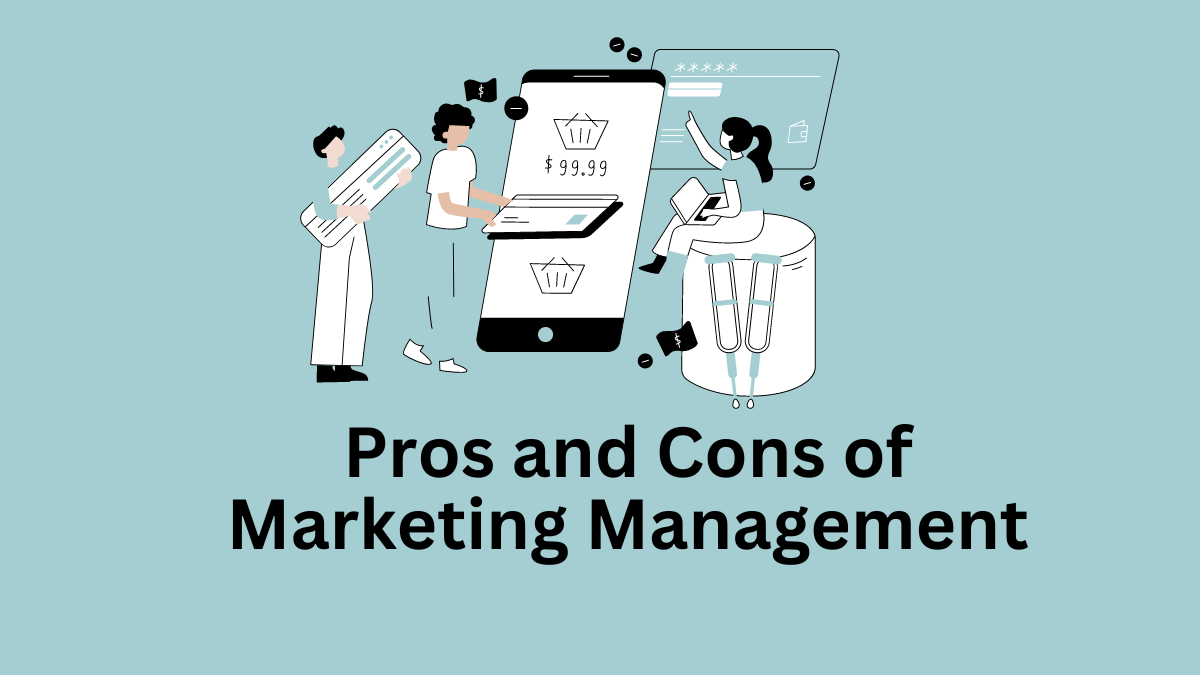Pros and Cons of Marketing Management
Marketing management is the combination of marketing and management, which is about the effective management of organizational activities in order to achieve the desired marketing goals efficiently. In this article, we will discuss the key pros and cons of marketing management.
Pros of Marketing Management
Marketing management plays a pivotal role in driving a company’s success by leveraging various advantages. Here are eight fundamental benefits that effective marketing management brings to the table:
Enhanced Customer Understanding
At the heart of marketing management is a profound analysis of customer preferences and behaviors. This comprehension empowers businesses to craft offerings that precisely align with customer needs, resulting in upgraded satisfaction and loyalty.
Effective Resource Allocation
Marketing management serves as a strategic compass for resource allocation, including budget, manpower, and time. This strategic approach prevents resource wastage and ensures optimal utilization, maximizing the impact of marketing investments.
Increased Brand Awareness
Through targeted campaigns and consistent messaging, marketing management elevates brand awareness. This sustained exposure cultivates a sense of familiarity and reliability, fostering trust and long-lasting relationships with customers.
Read Also: Selling Concept Vs. marketing Concept: 12 Differences
Competitive Edge
Skillfully devised marketing strategies create a competitive edge for businesses. By accentuating unique selling points and distinguishing a company from its competitors, marketing management positions the brand in a league of its own.
Improved Product Development
Marketing management thrives on customer feedback and market trends. By harnessing these insights, businesses refine and innovate their products, aligning them closely with consumer desires. This translates to successful product launches and delighted customers.
Strategic Pricing
Leveraging market insights, marketing management formulates effective pricing strategies. This ensures products are competitively priced while maintaining profitability, striking the delicate balance that drives sales and sustains business growth.
Efficient Communication
Marketing management produces clear and consistent communication with target audiences across diverse channels. This direction minimizes confusion, enhances brand perception, and nurtures robust connections with customers.
Read Also: 10 Importance of Marketing Management
Quantifiable Results
Through metrics and analytics, marketing management transforms campaigns from subjective endeavors into data-driven endeavors. This enables businesses to quantitatively gauge the success of marketing initiatives and promptly adjust strategies based on real-time data.
Cons of Marketing Management
Marketing management brings valuable advantages, but it’s essential to acknowledge the potential drawbacks:
Overemphasis on Data
While data is invaluable, relying solely on it can lead to underpass vision. Overlooking qualitative insights and human emotions might result in a lack of genuine customer connection.
Rapidly Changing Landscape
Markets and consumer preferences evolve rapidly. Marketing strategies that aren’t adaptable can quickly become outdated, necessitating constant adjustments to remain effective.
Read Also: Societal Vs. Holistic Marketing Concepts: 10 Key Differences
Resource Intensive
Successful marketing requires substantial resources – finances, skilled personnel, and time. Smaller businesses might struggle to implement comprehensive strategies due to limited resources.
Risk of Overspending
Ambitious campaigns can lead to overspending, especially when strategies lack a solid foundation of data. This risk is heightened when decisions are based on assumptions rather than concrete insights.
Misaligned Strategies
Misalignment with overall business goals can divert marketing efforts off course. Such disconnection might confuse customers and dilute the brand message.
Customer Overload
In a world saturated with marketing messages, crafting impactful communications is challenging. Poorly executed messages can easily get lost in the noise, failing to make an impression.
Unpredictable Outcomes
Marketing outcomes are influenced by various uncontrollable factors, including changing consumer sentiments, external events, and competitor actions. This unpredictability makes guaranteeing specific results difficult.
Understanding these potential challenges enables businesses to develop strategies that mitigate their impact. Balanced decision-making that incorporates both data-driven insights and qualitative understanding, agility to adapt to change and alignment of marketing efforts with overall business objectives are essential to address these concerns effectively.
Read Next: 6 Marketing Management Philosophies with Examples
Arti Kushmi holds a BBS (Bachelor in Business Studies) degree and shares her business and marketing knowledge through this website. While not writing she will be reading and enjoying the moment.
